We had a busy year at the Paulson Institute in 2015, building out our think tank and consolidating an array of energy, environmental, conservation and investment-related programs in both the United States and China. As we gear up for 2016, we’d like to take a moment to thank our partners and supporters (you!), and recap some of our biggest achievements from last year.
1 HOSTED: U.S.-China CEO Summit with President Xi in Seattle
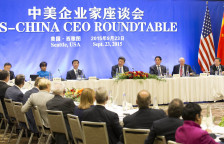 With our partner the China Council for the Promotion of International Trade, in we brought together the heads of leading U.S. and Chinese companies in Seattle in September for a roundtable discussion with President Xi Jinping about economic and business relations between the two countries. China’s reform and opening up, Xi said at the meeting, “will be like Alibaba’s ‘open sesame’: it will open but it will not close.”
With our partner the China Council for the Promotion of International Trade, in we brought together the heads of leading U.S. and Chinese companies in Seattle in September for a roundtable discussion with President Xi Jinping about economic and business relations between the two countries. China’s reform and opening up, Xi said at the meeting, “will be like Alibaba’s ‘open sesame’: it will open but it will not close.”
2 ADVOCATED: 94 U.S. CEOs Urge Prioritization of the BIT
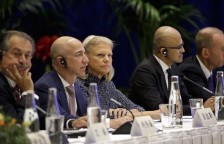 Together with the US-China Business Council, we organized 94 U.S. CEOs to sign a letter to President Obama and President Xi Jinping supporting a meaningful and high-standard Bilateral Investment Treaty (BIT). “We believe that increased cross-border investment flows will create economic growth and jobs, lending new momentum to the commercial relationship and fortifying the economic foundation already built,” the letter stated.
Together with the US-China Business Council, we organized 94 U.S. CEOs to sign a letter to President Obama and President Xi Jinping supporting a meaningful and high-standard Bilateral Investment Treaty (BIT). “We believe that increased cross-border investment flows will create economic growth and jobs, lending new momentum to the commercial relationship and fortifying the economic foundation already built,” the letter stated.
3 JOINED: Participated in the U.S.-China SE&D
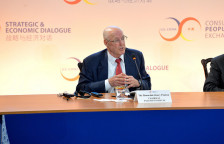 Paulson Institute Chairman Hank Paulson joined Vice Premier Wang Yang and U.S. Secretary of State John Jerry at the seventh joint meeting of the U.S.-China Strategic & Economic Dialogue (S&ED) in Washington, D.C. In his closing remarks, Paulson said: “…there is no better way to maximize a chance of avoiding the worst climate change outcomes than to have the U.S. and China working together to address this problem.”
Paulson Institute Chairman Hank Paulson joined Vice Premier Wang Yang and U.S. Secretary of State John Jerry at the seventh joint meeting of the U.S.-China Strategic & Economic Dialogue (S&ED) in Washington, D.C. In his closing remarks, Paulson said: “…there is no better way to maximize a chance of avoiding the worst climate change outcomes than to have the U.S. and China working together to address this problem.”
4 HOSTED: Symposium of Chinese Mayors at Paris COP21
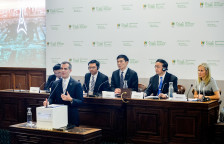 At the Climate Summit for Local Leaders at Paris COP21 in December, the Paulson Institute hosted a session on innovation and sustainable urbanization in China featuring eight leading Chinese mayors. The mayors highlighted their strategies for achieving China’s transition to a low-carbon economy, the challenges in mapping sustainable urbanization strategies, and opportunities in improving building energy efficiency and establishing green finance mechanisms.
At the Climate Summit for Local Leaders at Paris COP21 in December, the Paulson Institute hosted a session on innovation and sustainable urbanization in China featuring eight leading Chinese mayors. The mayors highlighted their strategies for achieving China’s transition to a low-carbon economy, the challenges in mapping sustainable urbanization strategies, and opportunities in improving building energy efficiency and establishing green finance mechanisms.
5 JOINED: Apple and Vanke join CEO Council
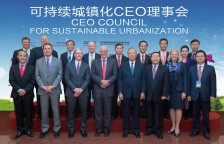 Apple’s Tim Cook and Vanke’s Wang Shi joined the Paulson Institute-CCIEE CEO Council for Sustainable Urbanization, which held its second annual meeting in Beijing in October. The mission of the CEO Council, which is comprised of CEOs from 17 U.S. and Chinese companies, is to harness the power of business to advance sustainable urbanization in China through innovative corporate environmental practices, direct actions by companies and governments, and support for effective government policies.
Apple’s Tim Cook and Vanke’s Wang Shi joined the Paulson Institute-CCIEE CEO Council for Sustainable Urbanization, which held its second annual meeting in Beijing in October. The mission of the CEO Council, which is comprised of CEOs from 17 U.S. and Chinese companies, is to harness the power of business to advance sustainable urbanization in China through innovative corporate environmental practices, direct actions by companies and governments, and support for effective government policies.
6 LAUNCHED: Building Energy Efficiency Fund
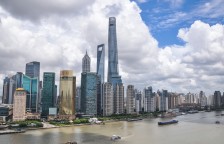 Together with China’s Leading Group on Economics and Finance, in September we helped launch the Building Energy Efficiency Fund to support the funding of energy efficiency technologies that will help China tackle pollution and meet its ambitious carbon emissions goals. The Chinese government has said it can only fund one tenth of the $1.6 trillion needed to fight pollution over the next five years.
Together with China’s Leading Group on Economics and Finance, in September we helped launch the Building Energy Efficiency Fund to support the funding of energy efficiency technologies that will help China tackle pollution and meet its ambitious carbon emissions goals. The Chinese government has said it can only fund one tenth of the $1.6 trillion needed to fight pollution over the next five years.
7 PUBLISHED: China’s Next Opportunity: Sustainable Economic Transition
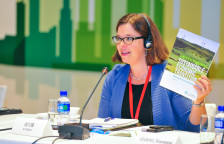 Our Climate & Sustainable Urbanization program produced a paper outlining a vision for a sustainable economic transition in the Beijing-Tianjin-Hebei (Jing-Jin-Ji) region, which could ultimately inspire an expansion of this transition across China. The paper was launched in October at the Paulson Institute and CCIEE Annual Sustainability Conference which convenes top Chinese and international business leaders, policy experts, mayors and policymakers.
Our Climate & Sustainable Urbanization program produced a paper outlining a vision for a sustainable economic transition in the Beijing-Tianjin-Hebei (Jing-Jin-Ji) region, which could ultimately inspire an expansion of this transition across China. The paper was launched in October at the Paulson Institute and CCIEE Annual Sustainability Conference which convenes top Chinese and international business leaders, policy experts, mayors and policymakers.
8 CO-LAUNCHED: Sustainable Soy Trade Platform
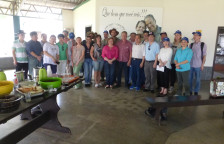 In partnership with Solidaridad, The Nature Conservancy and WWF, in March we launched the China-South America Sustainable Soybean Trade Platform aimed at helping key players in the soy industry work together to advance responsible procurement of soy from South American countries to the China market. In December, together with the China Soybean Industry Association, we led a delegation of top Chinese soy importers on a fact-finding mission to Brazil.
In partnership with Solidaridad, The Nature Conservancy and WWF, in March we launched the China-South America Sustainable Soybean Trade Platform aimed at helping key players in the soy industry work together to advance responsible procurement of soy from South American countries to the China market. In December, together with the China Soybean Industry Association, we led a delegation of top Chinese soy importers on a fact-finding mission to Brazil.
9 COMPLETED: Blueprint of Coastal Wetland Conservation and Management in China
 After 18 months of research, in partnership with the Chinese Academy of Sciences, the State Forestry Administration, and the Lao Niu Foundation, we produced in October a comprehensive Coastal Wetlands Blueprint, which maps out 180 priority conservation sites. The report predicts that if China fulfills its current 2016 economic development plans in the coastal regions, destruction due to reclamation will cross the “red line” of 800 million mu (53.3 million ha) of wetlands defined by the government as the bottom line required to maintain China’s basic ecological security, such as providing fishery products, fresh water and flood control.
After 18 months of research, in partnership with the Chinese Academy of Sciences, the State Forestry Administration, and the Lao Niu Foundation, we produced in October a comprehensive Coastal Wetlands Blueprint, which maps out 180 priority conservation sites. The report predicts that if China fulfills its current 2016 economic development plans in the coastal regions, destruction due to reclamation will cross the “red line” of 800 million mu (53.3 million ha) of wetlands defined by the government as the bottom line required to maintain China’s basic ecological security, such as providing fishery products, fresh water and flood control.
10 LAUNCHED: National Parks Project with the NDRC
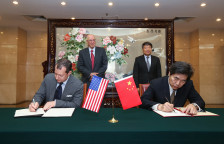 In June we announced a three-year cooperative partnership with China’s National Development and Reform Commission (NDRC) and the Heren Foundation to develop China’s emerging national park system. We started conducting in-depth international case studies from seven countries, organizing capacity building activities for officials and park managers, developing technical guidelines for the pilot provinces, and supporting research and planning work in the area around Mount Wuyi in Fujian Province.
In June we announced a three-year cooperative partnership with China’s National Development and Reform Commission (NDRC) and the Heren Foundation to develop China’s emerging national park system. We started conducting in-depth international case studies from seven countries, organizing capacity building activities for officials and park managers, developing technical guidelines for the pilot provinces, and supporting research and planning work in the area around Mount Wuyi in Fujian Province.


